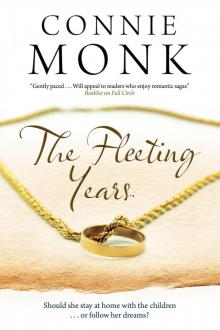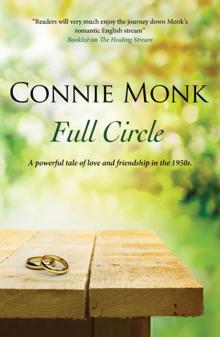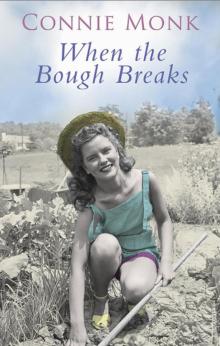- Home
- Connie Monk
The Fleeting Years Page 2
The Fleeting Years Read online
Page 2
‘I think it’s on a crossed thread. Don’t worry about it. When I get home I’ll do it with pliers.’ She just wanted to get away.
Just as she had, he took a handkerchief from his pocket so that he didn’t touch the cap, but she could see that in his case he did it to protect his hands. Some of her own embarrassment vanished with her respect for him. He looked so manly, yet his hands clearly never did a day’s work. Perhaps they didn’t, but they had the necessary strength and soon he was filling her tank for her.
‘Really you mustn’t bother, I can fill up quite easily.’ But ‘Sir Galahad’ was apparently deaf, for his only reply was a smile as if they shared a secret. She wasn’t used to feeling so uncomfortable. The job done he gave her another smile and a slight and rather foreign-looking nod of his head, making her half expect him to click his heels together, then turned back to his own car.
Back at Newton House it had been much as she’d imagined, her departure hardly registering in the excitement of Peter’s homecoming.
‘When did you find out you could get away?’ Zina asked him as they sat around the supper table. Early supper was the normal meal for the Marchands because when Peter was home he liked them to sit together as a family and when he was away Zina preferred to get the meal over and have a free evening for her music. So supper as they called it was no late evening snack, it was a cooked meal but early enough for Fiona and Tommy to eat with them. They were eating the pork casserole she had made for her mother to reheat, whilst she and Peter were meant to be celebrating at the French Horn.
‘Ages ago,’ he replied, ‘but I wanted to turn up and surprise you all. Much more fun, eh kids? Not just one night in a miserable hotel, oh no, you have me underfoot for a week … a fortnight … I’ve no idea. They will let me know when my presence is required. Today the crew are moving to the Suffolk coast to film on location, parts of the storyline where I have no place. So, my love, I’ve come home so that you three can spoil me thoroughly.’
To the three at the table it sounded like magic, for a two- week uninterrupted stay was a rare event when he was working on a film. Zina even forgave him for not realizing how she had felt when he’d phoned her at the last minute. For all four of them nothing could mar the wonder of that early evening suppertime. No one could have foreseen the storm clouds rising just above the horizon.
Much later Zina was slipping towards sleep, utterly content, all her misgivings laid to rest. She had looked forward to the night away with Peter knowing it would be wonderful, but the last half hour had been more than that. Sometimes his love-making was wildly, almost greedily, passionate; but not tonight. She felt that their coming together had more than simply satisfied their physical needs; it had been a meeting of all that they were. As she drifted towards sleep, she smiled.
So often, when he turned away and settled for the night she would be wide awake, but it seemed this time was different.
‘I meant to tell you’ – his conversational tone surprising her – ‘I met someone called Celia Turnbull, a writer. Have you ever heard of her?’
At his words Zina was wide awake. ‘I think I’ve read everything she’s written. I love her books. How did you meet her?’
‘I went out for a meal the other night with Herbert’ – Herbert St Clare was a director and a friend of them both – ‘and this woman was at the same restaurant, eating alone. Apparently one of her books is being turned into a film. Herbert is an old friend so she joined us. You’d like her. Or more to the point you will like her. She has bought a place quite near – across the river towards Picton Heath. She’s having a lot done to it just like we did here. It appears that last time she was down to see the progress her car packed up on her and she had to leave it behind for repair. So I gave her a lift down. Yes, I think you two will get along well. If you like what she writes you’re halfway to liking her already.’
‘How exciting. Is she here to stay now, or just seeing how the work is going?’
‘Just a week or two – roughing it, she called it, while she checks that everything will be in order. I don’t imagine she would be above being surrounded by chaos. She’s quite a character. But I won’t influence you, you must see for yourself. Give it a day or two and I’ll drive over and ask her across for a drink.’
‘Lovely.’ That’s when she decided this was the opportunity to tell him about the letter. ‘Peter, now that we’re chatting like this, I want to talk to you about a letter I’ve had. It’s from Derek Masters, the pianist.’
‘Don’t know the name, but you know what a philistine I am when it comes to your sort of music. Is he someone famous or one of your old buddies?’
That remark was the first prick to her bubble of happiness.
‘He’s sufficiently good that if he were a concert soloist his name would be famous enough for even a philistine to have heard of him,’ she retorted, then before she could stop herself she added, ‘as famous as a jobbing actor turned film idol. But he is part of the Meinholt Piano Quintet; in fact it was he who founded it. Now I suppose you’re going to say you’ve never heard of them either.’
‘True,’ he agreed affably enough, not a bit put down by her comment.
‘You remember I told you I was playing in Exeter last week at a charity concert.’ A grunt from Peter. ‘Don’t go to sleep, please listen, this is important. I haven’t even told Mum, I intended to talk to you at lunch today.’
Peter was awake. ‘Sorry, interrupting you just a minute. Lunch. I did stop off at the French Horn, you know. We even raised a glass to my bride. Celia thoroughly enjoyed it all. Go on, what about this pianist chap?’
‘It sounds big-headed and I don’t mean it to, but he made a point of coming to talk to me after the concert and we chatted for a long while. So good having Mum willing to stay the night here. Anyway, he was very complimentary about my playing, and apart from the fact that I thought what a nice chap he was I put the whole thing out of my head. Then yesterday morning I had this letter from him. There are two violinists in the quintet, a viola and a cello – and Derek himself on the piano. One of the two violinists has warned them that she will be leaving in a few months as she’s pregnant.’
‘Why tell you? He hardly knows you.’ But from his changed tone of voice she could tell he had guessed exactly why Derek Masters had told her.
‘He has suggested I replace her.’ She had read the letter a dozen times, but actually hearing herself speaking the words was something quite different … actually being part of the wonderful Meinholt Piano Quintet! She wanted to say it all again just to hear it spoken.
‘But that’s ridiculous! Clearly he doesn’t know you have a husband and children. You must answer him quickly, it wouldn’t be fair to mess him about. He’ll have to get someone else.’
‘Why?’ There was no tone of enquiry in the single word; it was an ice-cold sound dropped into the silence.
‘You ask why? You can’t be serious. Have you no conception of what it would mean to the family and to me to have you concentrating on your fiddle when you ought to be giving your time to the home and the children. You can’t expect Mother-in-law always to be at your beck and call. I’ve never heard a more crazy idea. Didn’t you tell this chap you’re married with a family?’
There was a long silence; neither knew how to break it. They were rushing towards a precipice and what could stop them going over the edge? After what seemed like eternity but was probably no more than a minute, time enough for Peter to become confident that she had digested his words and seen the wisdom of them, it was Zina who spoke.
‘Since I was six years old, I have loved playing,’ she said, speaking clearly and quietly, something in her tone telling him her mind was already made up. ‘All my childhood and youth it came first in my life, up until I met you. Even then, while you were with the rep you were happy for me to give recitals. But that lasted no time because I was pregnant so soon. I’m still that same person, Peter. I love you as I always have – always will – but I have
a life of my own. Next term the twins will be away at St Mary’s, the school of your choice – a good one, too, as it’s co-ed. I agreed with you that it would be much better for them than having to travel each day all the way to Exeter and go to separate schools. If I joined the quintet before the start of term in September I know Mum would be here for them.’ Her voice was becoming more strident, a warning that her calm might break. ‘Am I supposed to spend my life alone here waiting for phone calls from you when you have nothing more exciting to do, looking for letters from the children, reading, killing time …?’
‘In a house like this I should have thought there was plenty to amuse any woman. You know you’re never kept tied to the house, nor are you ever short of money to spend.’
‘I don’t want amusement and I’m not thinking of money, I want the joy of making music, combining the sound of my playing with other people’s. It’s not fame I want, Peter, nor independence. Can’t you understand how I feel to be stripped of what was the most important thing in my life? The house won’t be neglected, and I know without even asking her that I can rely on Mum.’
‘It’s the most ridiculous thing I’ve ever heard. It’s almost ten years since you have played except at some local do or other. All right, you trained and you were supposed to be quite promising but, God alive, in those ten years imagine the number of students who have left with as good a record and been playing ever since. Do you honestly think you could keep up with professionals? I don’t want to see you humiliated. You practise a bit before you play at some local do, and I expect they all think you’re wonderful, but to put yourself on a par with professionals is asking for humiliation. Just play the damned thing for amusement. One pro in the family is enough.’
She wished she hadn’t mentioned it. Ten minutes ago they had known the wonder of complete union, nothing else had mattered for either of them. Now she felt she hardly knew him at all. And he? What was he feeling about her?
‘You’re wrong,’ she said quietly, reaching to take his hand in hers, ‘except when you’re home there isn’t a day when I don’t play, really play, extending myself I mean and not just playing familiar stuff, for two or three hours. I know I’m better now than I was ten years ago and I just yearn to be part of it. Can’t you try and understand, Peter?’
‘If you want the truth, no I can’t. If you were a writer like Celia Turnbull I’d have no objection, you could combine that with being at home for the family. But what you talk of is sheer selfishness.’
‘I’m going to sleep. I shall answer the letter in the morning.’
And so they turned away from each other, lying silently and feigning sleep.
The next day she wrote to Derek Masters agreeing to his suggestion to meet him when the quintet was in Deremouth the following month.
‘See what I’ve written, Peter,’ she said, passing him the single sheet of paper. ‘It commits me to nothing – neither me nor him – but I have to follow it up. Perhaps you’re right and I’m not good enough. But I just have to grasp an opportunity like this. I bet when I tell Mum she’ll say the same.’
‘You’re not married to your mother, of course she will. I’ve given you a good home here, you want for nothing except you crave praise and adulation – or do such words cheapen the classical music profession? I can’t understand what’s happened to you.’
‘Don’t, Peter. If you don’t understand, I can’t explain. I don’t want adulation or praise, all I want is to be part of the making of music.’
‘For pretty well ten years you’ve never even mentioned your wretched violin. Is it because the children are going to school in a few months? Do you want to keep them here until they are thirteen and can go straight into the senior school? Are you frightened of being too much on your own here? I can understand that. What you really need is another baby—’
‘I most certainly do not!’
‘How about if we get a flat in London, would you be happier there and just come back here when we’re all free?’
‘London? How often are you in London? What in the world would I want with that?’
‘God give me strength!’ With his hands in the air he looked upwards as if for help.
‘Shut up, Peter, stop play acting.’
In silence they looked at each other, both reading fear in the other’s eyes, dread of something they were too scared to face. Then, without either of them consciously being the first to move, they covered the space that separated them and clung to each other like drowning men being thrown a lifeline.
‘Perhaps nothing will come of it,’ she whispered. Nuzzling against his shoulder, she continued, ‘But it’s nothing to do with my wanting to escape from all this, it’s just something that’s missing in my life. I have to try, please understand darling, I have to.’
Whether or not he was any nearer to understanding she couldn’t tell but when he said, ‘Post your letter, the sooner you find out the truth the better’ his voice was gentle.
‘I love you, Mr Marchand – I hate it when we quarrel.’
‘And I love you, Mrs Marchand. I guess that’s why it is we have the power to hurt each other.’
The letter posted, they both avoided any mention of Derek Masters’ suggestion and Zina didn’t touch her fiddle until the Saturday of that first week when Peter took Fiona and Tommy to Bristol Zoo. Even though it was never mentioned, it cast a cloud on what should have been a perfect interlude. Not that the twins noticed anything odd in the atmosphere because Peter and Zina disguised the shadow that hung over them by being exaggeratedly cheerful.
‘I wish Dad didn’t have to go away. Other people’s dads don’t,’ Tommy whispered to Fiona when he crept along to her bedroom after they’d gone to bed that night. It was a nightly ritual, something they wrongly believed was secret from their parents. They both thought of it as their special time. If they’d had enough money to go to the sweet shop after school there would be a bar of chocolate to share, but with or without confectionery, there was something very special about their whispered exchanges after the light was turned off.
‘Other people’s fathers are nothing special. Ours is important, everybody all over the country—’ to stress the point Fiona corrected herself – ‘all over the world I expect, see films with him being the most important person in them. I bet it’s great being in films like that. When I get old enough, that’s what I’m going to do. Sometimes I’ll come home to see you and Mum, like Dad does, and I’ll be like him, special not ordinary.’
‘Better to have him always at home so we were like other families. And you too, much better for us all to be together,’ Tommy replied. Then, his mind going to the children in their class at school, he added, ‘But we’re lucky really, we do have a dad, not like Morna or Vera …’
Fiona pondered the point before she replied. ‘They must both have had fathers in the beginning. I expect their parents quarrelled and got divorced, some people do. So we’re lucky, even if he’s away being famous, he and Mum never fight.’
‘Crumbs, no. If they did it would be awful; gives you a funny tight feeling in your tummy just to think about it, doesn’t it.’
But Fiona’s mind had jumped ahead to more important things.
‘Hey, Tommy, in the morning if it’s warm like it was today, let’s ask Dad to take us to Deremouth. They’ll say—’ and here she put on what she called a grown-up, bossy voice – “It’s not summer yet, you can only paddle.” But, tell you what we’ll do, when we get dressed in the morning we’ll put our cossies on under our clothes. I bet you Dad’ll say we can go in once he knows we’re kitted out.’
Giggling in anticipation and imagining the sea as it had been at the end of the previous summer rather than after the storms of winter, they said their whispered goodnight with their thoughts already on the morning. Then Tommy crept back to his own room. At that point even he hadn’t considered that Zina might be included in the plan for the trip to Deremouth. It had become routine that when Peter was able to be at home,
he spent time alone with the twins, as if that way they would all make up for his periods of absence.
Next morning the sun promised a good day ahead and Peter willingly fell in with the plan.
‘Let’s go to the café on the pier, can we do that, Dad? Their ice cream is just scrumptious.’ In Fiona’s mind they were already there, attacking a bowl of ice cream topped with delicious chocolate sauce.
‘Play your cards right, kids, and we might do just that and have fish and chips for lunch. How would you like that, Zina?’
‘Me? I thought this was an outing for you and the twins.’ There was no resentment in Zina’s tone. ‘I have lots to do here. Just you three go. But if I know you’re not coming home for the usual Sunday lunchtime feast, I’ll cook for early evening instead.’
For a brief instant their glances locked. Eager to get on their way, Fiona gave it no thought. But for some reason there was an uncomfortable feeling in the pit of Tommy’s stomach.
‘We’d like you to come too, Mum. All of us together would be fun, wouldn’t it?’ He looked to Fiona to back up his words, but he looked in vain. She was busy working out how to get towels packed in the car without arousing suspicion.
‘No, just the three of you go. I’ll have dinner ready for six o’clock. OK?’ Zina spoke in an over-bright tone that fooled no one except Fiona. Letting her glance meet Peter’s again, Zina felt torn. If only he’d hold out his hand to her, just say that the day would be incomplete without her … but that was stupid, she told herself. She was there for the twins at any time, like a cooked breakfast before she drove them to school or smooth sheets in their well-made beds, a new tube of toothpaste always ready when the old one had been squeezed flat. That’s what mothers were for, she thought bitterly. Well, it wasn’t going to be like that, she had a life too. Peter wasn’t the only one with a career that mattered.

 The Healing Stream
The Healing Stream The Fleeting Years
The Fleeting Years Full Circle
Full Circle When the Bough Breaks
When the Bough Breaks